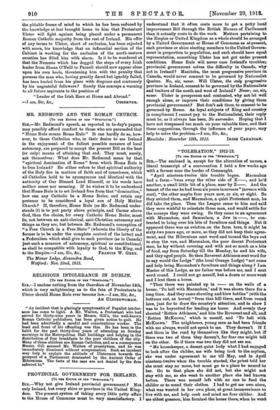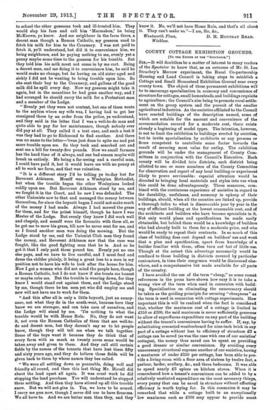" TOLERATION," 1912-13.
[To TER EDITOR OF TER "SPECTATOR.") SIR,—The enclosed is, except for the alteration of names, a literal transcript of a conversation I held a few weeks ago with a farmer near the border of Connaught.
"April nineteen-twelve this trouble began. Macmabon had a farm—'twas away the other side of X—, and he'd another, a small little bit of a place, near by Z—. And the tenant of the one be had been six years in arrears" (arrears with rent), " the other maybe four years now, or six, or eight. So they evicted them, and Macmahon, a quiet Protestant man, he did take the place. Then the League came to him and said they were wishful to reinstate those men, and would settle for the moneys they were owing. So they came to an agreement with Macmahon, and Samuelson, a Jew in —, he con- tracted to bring over his bits of furniture and things. But it appeared there was an eviction on the farm here, it might be sixty-two years ago, or more, so they did not keep their agree-, ment, and the Hibernians sent word and turned the boys out to stop the van, and Macmahon, the poor decent Protestant man, he lay without covering and with not so much as a bite of food, say from Saturday till the Monday, he and his wife, and they aged people. So then Reverent Atkinson sent word for to say would the Lodge" (the local Orange Lodge) "not come and help bring Macmahon's furniture and things along P lam Master of this Lodge, as me father was before me, and I sent word round. I could not go meself, but a dozen or more went and I lent them a horse.
"Then there was painted up in — on the walls of a house, ' To hell with Macmahon,' and it was shown there for a long time. And they came shouting and blew bottles" (with the bottoms out, as horns) "from that hill there, and from round here, just for to draw the country's attention, and to show I was to be boycotted for lending me horse. And evenly they shouted ' Rotten Atkinson,' and him the Reverent and all, and 'Rotten McKeown,' which is meself, and To hell with McKeown.' The neighbours, young men as had been friends with me always, would not speak to me. They daresn't. If I met them in the road by themselves like they might, but if there was two of them they daresn't, for fear one might tell on the other. So if there was two they did not see me.
"Me housekeeper, a decent quiet body what I had engaged to look after the childer, me wife being took to the asylum, she was under agreement to me till May, and in April nineteen-twelve when the trouble started, the priest told her she must stay no more, but must go to a place he named to her. Go to that place she did not, but she might not stay with me, so she went to another place she had known before. There was meself left with no one to feed the childer or to mend their clothes. I had to get me own niece, what was wanted in her own place, at great inconvenience to live with me, and help cook and mind me four childer. And me eldest gossoon, him forninst the house there, when he went
to school the other gossoons took and ill-treated him. They would slap his face and call him Mactnabon,' he being McKeown, ye know. And me neighbour in the farm there, a decent man though a Roman Catholic, my gossoon used to fetch his milk for him to the Creamery. I was not paid to fetch it, ye'll understand, but did it to convenience him, we being neighbours, and he paying nothing to me, evenly yet a penny maybe some time to the gossoon for his trouble. But they told him his milk must not come in by me cart. Being a decent man, and me doing it to convenience him, he said he would make no change, but he having an old sister aged and sickly I did not be wanting to bring trouble upon him. So she sent their boy to the Creamery, and gallons of the good milk did he spill every day. Now my gossoon might take it again, but in the meantime he had gone another way, and I bad arranged he should early the milk for a Protestant man and a member of the Lodge.
" Evenly yet they were not content, but one of them wrote to the asylum where my wife was, I having had to get her consigned there by an order from the police, ye understand, and they said in the letter that I was a well-to-do man and quite able to pay for her maintenance, though nobody ever did pay at all. They called it a test case, and such a test it was they had to go to Richmond to find another. And there was no name to the letter—'twas just done to spite me and put more trouble upon me. So they took and searched out and sent me a bill for twenty-five pounds. Now we small farmers has the hard time of it always, and one bad season maybe will break us entirely. Me being a far-seeing and a careful man, I could have paid it, but it would leave me with no penny at all to work me farm, and that was ruination.
"It is a different story I'd be telling ye to-day but for Reverent Atkinson. Meself were a Wesleyian Methodist, but when the trouble began the other Wesleyians looked coldly upon me. But Reverent Atkinson stood by me, and we fought it in the Court, and he saw I was defended. The other Unionists saw to that and managed the money between themselves, for since the boycott began I could not make much of the money I had made. Always I bad mowed the grass for them, and for the priest himself, though he knew I was Master of the Lodge. But evenly they knew I did work well and chapely, and meself were the favourite with them all, so he got me to mow his grass, till now he never sent for me, and so I .found another man was doing the mowing. But the Lodge stood by me, and the Unionist Club men they found the money, and Reverent Atkinson saw that the case was fought, like the good fighting man that he is. And so he got it that I only paid three pound ten. Evenly yet no one else pays, and we have to live careful, and I must feed and dress the childer plainly, it being a great loss to a man in my position not to have his wife to look after the house for him. Now I got a woman who did not mind the people here, though a Roman Catholic, but I do not know if she treats me honest or maybe robs me. But the trouble is wearing down, for they know I would stand out against them, and the Lodge stood by me, though there be ten men yet who did employ me and now will not have me to work for them.
"And this after all is only a little boycott, just an annoy- ance, not what they do in the south-west, because here they know we are stronger, and can take care of ourselves, and the Lodge will stand by me. 'Tis nothing to what the trouble would be with Home Rule. No, they do not want it, not even the Roman Catholics of them that are well-to- do and decent men, but they daresn't say so to let people know, though they will tell me when we talk together. Some of the boys want it because they do think that of every farm with as much as twenty acres some would be taken away and given to them. And they call still certain fields by the names of the tenants that have lost them fifty and sixty years ago, and they do believe those fields will be given back to them by whose names they bes " We were all settling down so peaceable, doing well and friendly all round, and then this last thing Mr. Birrell did about the land upset all again. It was cruel work he did stopping the land purchase. You will understand he stopped them settling. And then they have stirred up all this trouble anew. But we will not give in. Yes, we have to be armed. I carry me gun now, though I never did use to have firearms. We all have to. And we are better men than they, and they know it. No, we'll not have Home Rule, and that's all about it. They can't make us."—I am, Sir, &c.,



















































 Previous page
Previous page